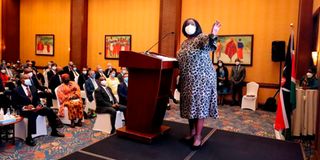Kenya set to push Africa’s agenda at UN

Foreign Affairs Cabinet Secretary Raychelle Omamo addresses foreign envoys at the Serena Hotel in Nairobi on September 17, 2021, on Kenya's foreign policy position as it prepares to take over the presidency of the United Nations Security Council in October.
Kenya is preparing to chair the United Nations Security Council, with plans to use the opportunity to push solutions for enduring problems like terrorism and climate change.
But Nairobi must also contend with a new problem that has threatened everything: Covid-19.
On Friday, Foreign Affairs Cabinet Secretary Raychelle Omamo said Kenya will make its views known at both the UN General Assembly and Security Council on why the world must defeat vaccine apathy, and cultivate a practice where Africans take leading roles in their affairs.
Ms Omamo was addressing members of the diplomatic corps in Nairobi when she presented Kenya’s agenda, and views on how to resolve vaccine inequality, refugee problems, insecurity and climate change.
Africa remains the most vaccine-poor continent, having only received 2 per cent of the more than five billion vaccines already consumed around the world.
“We need to ask ourselves, in a world where people talk of human rights, is this what the world can do? There must be some balance in our world. There has to be a change, a new way of thinking,” Ms Omamo said, criticising the current donor-dependent health response, even at the UN itself.
The UN General Assembly, an annual meeting of global leaders at the UN headquarters in New York, began last week, but countries have opted to reduce the sizes of their delegations due to Covid-19 and travel restrictions. Ms Omamo will be leading the Kenyan delegation while President Uhuru Kenyatta is expected to give a virtual speech l.
Kenya, she argued, wants adequate lessons picked from the poor handling of the pandemic, such as the need to quickly pass a “pandemic treaty” at the World Trade Organisation (WTO) so that manufacturers are temporarily allowed to share their technologies around the world for vaccines or drugs that fall in the pandemic category.
Kenya, South Africa and Senegal have been pushing for a waiver of intellectual property rights to allow African countries to produce their vaccines, but this is yet to be endorsed.
The theme of this year’s General Assembly is “Building resilience through hope – to recover from Covid-19, rebuild sustainability, respond to the needs of the planet, respect the rights of people, and revitalise the United Nations”.
‘Listening to Africa’
Ms Omamo suggested that the World Health Organization (WHO) needs to shift from containment to investment in people.
“It is no longer tenable to have a world health structure that is only interested in containing outbreaks in certain parts of the world,” she said.
She added: “Debt relief, and sustainability is a huge issue for the African continent. As Africans, we should not be ashamed that the debt relief initiatives are not enough. We no longer want to be told how we should recover; we want a conversation on recovery.”
The General Assembly has not directly listed debt as a topic , but it is tackling issues that may still include debt discussions, such as food systems, climate change, global governance and regional peace and security.
Kenya will be taking on a bigger task in October when it takes the presidency of the UN Security Council for the first time in 22 years. A rotational post, holders conduct and run meetings and the agenda, besides representing the Council in relating with other agencies and member states.
Although Kenya is a non-permanent member of the UN’s most powerful body, Ms Omamo said Kenya wants to use the occasion to ensure people “listen to Africa.”
“Because we have an understanding of the complexity of issues in Africa, I think our ideas carry weight. You will be hearing African ideas,” she said.
Kenya and several African countries have argued the Council, as constituted, is biased against Africa: having no veto-holding member from Africa, but receiving the most resolutions.
Ms Omamo said the world will never solve Africa’s problems unless it places the continent in charge of the search for solutions.
Most of the meetings will be chaired by Kenya’s diplomats, but President Kenyatta will preside over some. Among the key meetings planned is one on identity, state building and search for peace, which President Kenyatta is expected to convene in his first session on October 12.
The President will seek views from members on how the growing technological revolution, urbanisation, inequality, environmental degradation and population growth have contributed to rise of conflict in Africa.
The President will also, on October 28, convene another meeting on how the African Union’s existing peace structures can become the basis for the UN’s partnership with African organisations to solve local problems.





